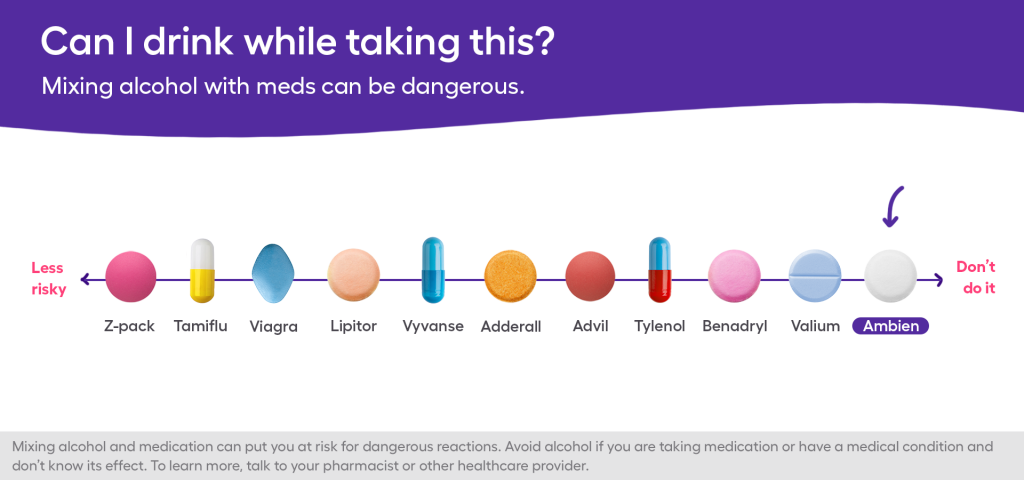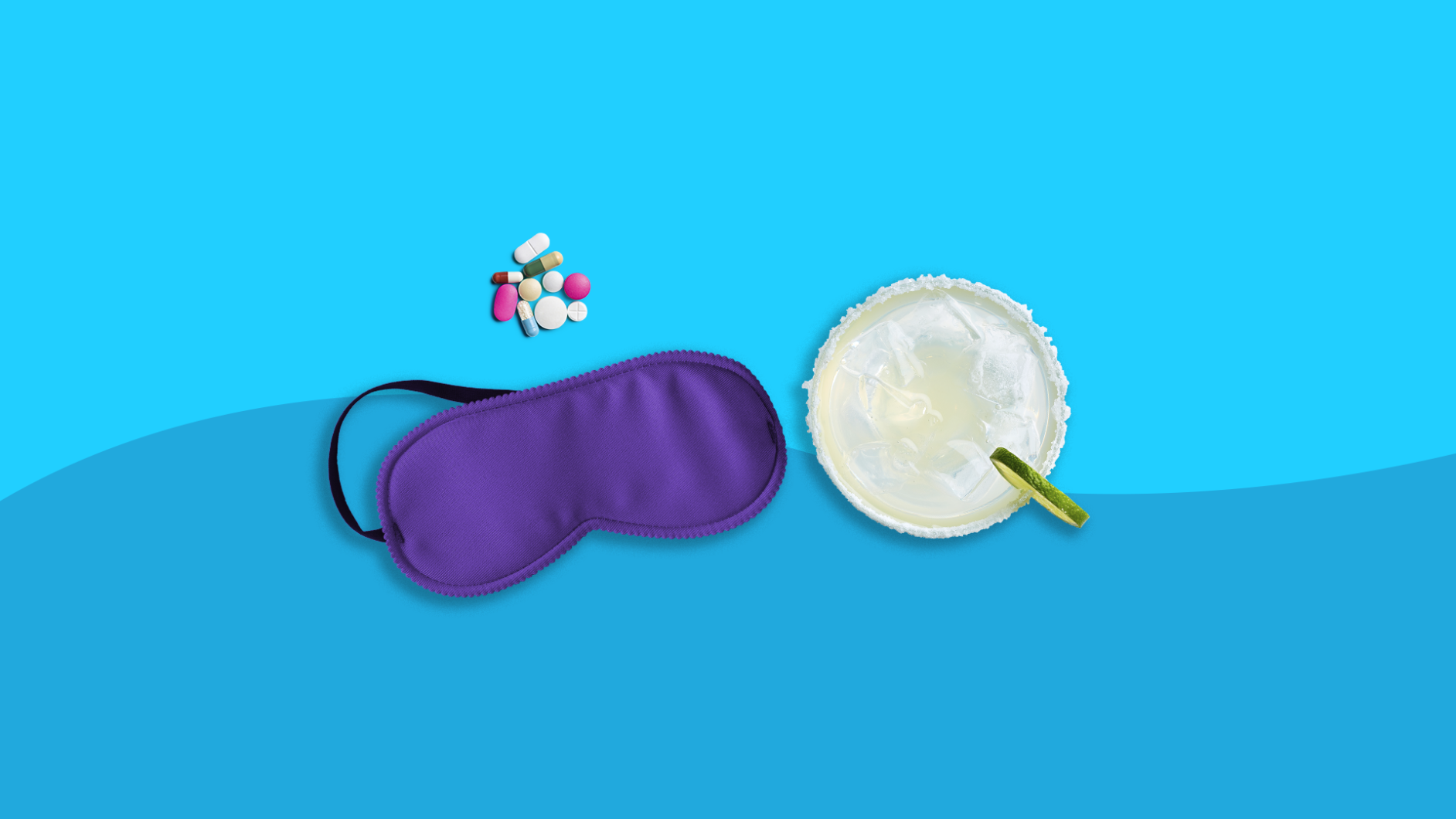Key takeaways
Combining sleeping pills and alcohol is extremely dangerous as both are central nervous system depressants that can reduce respiratory rate to life-threatening levels.
Sleep aids mixed with alcohol do not only pose serious health risks but also result in poor sleep quality, as alcohol prevents the body from entering deep, restorative sleep stages.
The safest practice is to choose either alcohol or a sleep aid but not both, with a minimum recommended waiting period of six hours between consuming alcohol and taking a sleep aid to avoid risks.
Improving sleep habits and considering cognitive behavior therapy are recommended over long-term reliance on sleep aids, as they provide a more effective and side-effect-free approach to achieving better sleep.
Forty-nine percent of adults with high stress levels report trouble sleeping, according to the American Psychological Association. Are you considering a sleep aid to help you nod off? That is fine if your doctor recommends it. But, if you are also using alcohol to help you unwind or cope, you could be playing with fire. Combining sleeping pills and alcohol is extremely dangerous, says Jeff Fortner, Pharm.D., an associate professor at Pacific University in Forest Grove, Oregon, and a member of SingleCare’s Medical Review Board. You absolutely should not do it.
And while some sleep aids carry higher levels of risk, the warning applies to all varieties, including Ambien (the most commonly prescribed sleep aid), Lunesta, and Sonata, as well as a new class of prescription sleep aids called orexin receptor antagonists (drugs in this class, which recently received FDA approval, include Belsomra).
The risks of combining sleeping pills and alcohol
Alcohol and sleep aids are both central nervous system depressants, Dr. Fortner says. On their own, the drugs slow your respiratory rate. This is how the drugs help you relax and fall asleep. Mixing sleeping pills with alcohol can diminish your breathing to a dangerously low level—a potentially life-threatening scenario.
“CNS suppression [can] make someone stop breathing and die, so that would obviously be the worst outcome,” he says.
Michael Breus, Ph.D., a sleep medicine specialist in Los Angeles, calls it a multiplicative effect. “If you are taking a sleep aid and you have alcohol on board, it is like you tripled the dose [of the sleep aid],” he says.
Not only that, the combination is likely to make any sleep you do get relatively useless. That is because even though sleep aids help people sleep, they don’t necessarily help people get the deep, refreshing sleep the body needs. The addition of alcohol renders sleep quality even worse.
“If you add alcohol on top of [a sleep aid], it makes you stay in a light sleep,” Breus explains.

Choosing between an Ambien and alcohol
What if you simply cannot fall asleep without the help of a sleep aid? The only safe solution, unfortunately, is to forgo that glass of wine.
“You can have a glass of wine or a sleeping pill, but not both,” Breus says. He recommends making a decision in advance and sticking to it.
An important reminder—just like you should not drink and drive, you should never drive after taking a sleeping pill. For example, don’t take a sleeping pill before driving home, thinking it will take a while to kick in. Take the sleeping pill just before bed, when you have at least eight hours to sleep.
How long should you wait to take a sleeping pill after drinking alcohol?
And Dr. Fortner warns that while everyone’s metabolism is different, the absolute minimum period of time between a drink and a sleep aid is six hours. Still, he urges people to avoid combining the two altogether—it isn’t worth the risk.
What if you have a glass of wine, and inadvertently take a sleep aid later? Are you at imminent risk of a life-threatening drug-drug interaction? To make sure you are safe, the best approach is to a) stop drinking immediately and b) ask a friend or family member to help monitor any symptoms. Signs of a potential problem include excessive dizziness and drowsiness, fainting, difficulty breathing, and a slow heart rate.
And if something seems “off,” but you don’t know if it is a serious issue? Better to be safe than sorry. “If you are unsure what to do, call your doctor or pharmacist for help,” says Dr. Fortner. “If you think you are experiencing a life-threatening emergency, then call 911.”
What happens when you mix melatonin and alcohol?
Melatonin is a dietary supplement that many people view as a safer sleep aid than prescription pills. It’s a hormone that your body naturally produces to keep your sleep cycle, or circadian rhythm, consistent. Even though it’s available over-the-counter, it should not be mixed with alcohol. The combination can cause side effects like drowsiness, dizziness, anxiety, or increased blood pressure. Like sleeping pills, you should choose alcohol or melatonin—not both.
RELATED: Finding the right melatonin dosage
Work on your sleep habits
With all of this said, Breus says he encourages people to work toward getting good sleep without the use of sleep aids. It’s better overall for your health—and it also means you can have that glass of wine without worry. Sleep aids have their place, he says, and as a general rule, a three-month course of treatment under the supervision of a healthcare provider can get you on the right track. However, he doesn’t like to see patients become reliant on sleep aids—in part because they don’t promote that deep sleep everyone needs. Instead, he encourages people to improve their sleep habits through cognitive behavior therapy.
“Cognitive behavior therapy is more effective than sleeping pills, it lasts longer and has no side effects when mixed with alcohol,” he says.
READ NEXT: 23 ways to sleep better tonight




